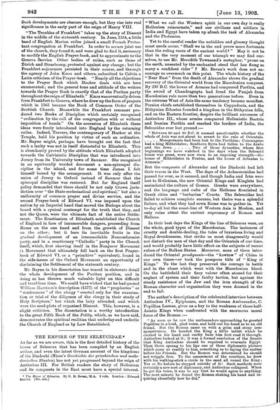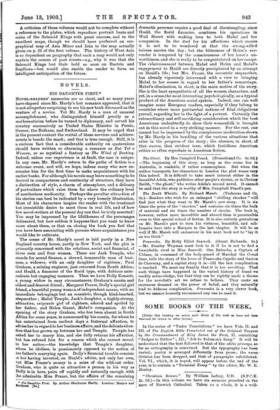THE EMPIRE OF THE SELEUCIDAE.*
As far as we are aware, this is the first detailed history of the house of Seleucus that has been compiled by an English author, and even the latest German account of the kingdoms of the Diadochi (Niese's Geschichte der griechischen und make- clonisehen Staaten) has not yet progressed beyond the reign of Antiochus IIL For British readers the story of Hellenism and its conquests in the East must have a special interest.
•
The House of Batumi. By E. E. Bevan, M.A. 2 vole. London : Edward Arnold. Pos.
" What we call the Western spirit in our own day is really Hellenism reincarnate," and our civilians and soldiers in India and Egypt have taken up afresh the task of Alexander and the Ptolemies.
Yet to the careful reader the unbidden and gloomy thought must needs occur, "Shall we in the end prove more fortunate than the ruling races of the ancient world P " May it not be that in the very moment of our triumph we may find our- selves, to use Mr. Meredith Townsend's metaphor, " prone on the earth, unseated by the enchanted steed that has flung so many a confident rider " P Mr. Bevan's work does not en- courage us overmuch on this point. The whole history of the "Near East" from the death of Alexander shows the gradual recovery of the Oriental world from the Macedonian conquest.
By 230 B.C. the house of Arsaces had conquered Parthia, and the sword of Chandragapta had freed the Punjab from Macedonian rule more than two generations before. Even in the extreme West of Asia the same tendency became manifest. Persian chiefs established themselves in Cappadocia, and the Bithynian Ziboetes founded a kingdom in the Bithynian hills,
and on the Eastern frontier, despite the brilliant successes of Antiochus III., whose armies conquered Hellenistic Bactria
and Iranian Parthia and reached the borders of India, the Seleucidae ever lost ground :—
" Between 90 and 80 B.C. it seemed questionable whether the whole of Asia was not about to revert to the rule of Orientals.
Mesopotamia had been lost to the Parthiaaa ; Commagene had a king Mithridates ; Southern Syria had fallen to the Arabs and the Jews Two of those dynasties, whose first beginnings we have watched in the days when the Seleucid house was great, were now risen to an imposing strength—the house of Mithridates in Pontus, and the house of Artaxias in Armenia."
But the conquests of Alexander and the Diadochi had left their traces in the West. The days of the Achaemenidae had passed for ever, as it seemed, and though India and Iran were lost to Hellenism, the new Oriental Kings and Kinglets had assimilated the culture of Greece. Greeks were everywhere, and the language and cults of the Hellenes flourished in Greek cities and " barbarian " Courts. The Seleucidae had failed to achieve complete success, but theirs was a splendid failure, and what they had sown Rome was to gather in. Yet to-day all but the coast-line of Western Asia is Moslem, and only ruins attest the ancient supremacy of Roman and Hellene.
In their best days the Kings of the line of Seleucus were, on the whole, good types of the Macedonian. The instances of cruelty and double-dealing, the tales of luxurious living and Royal drunkenness, that strike us most disagreeably would not disturb the men of that day and the Orientals of our time,
and would probably have little effect on the subjects of recent rulers of the Balkan States. Moreover, none of them intro. duced the Oriental proskynesis—the " kowtow " of China in our own times—or took the pompous title of " King of Kings." To the last they preserved the courage in battle and in the chase which went with the Macedonian blood. On the battlefield their fiery valour often atoned for their neglect of system and their faulty tactics, but against the
steady resistance of the Jew and the iron strength of the Roman character and organisation they were doomed in the end to fail.
The author's description of the celebrated interview between Antiochus IV., Epiphanes, and the Roman Ambassador, C. Popillius Lamas, gives us a key to the weakness of these half- Asiatic Kings when confronted with the enormous moral force of the Roman :-
" As soon as he saw the ambassadors approaching he greeted Popillius in a loud, glad voice, and held out his hand as to an old friend. But the Roman came on with a grim and stony irre- sponsiveness. He handed the King a little tablet which he carried in his hand and curtly bade him first read it through. Antiochus looked at it; it was a formal resolution of the Senate that King Antiochus should be required to evacuate Egypt. Then there sprang to his lips one of those diplomatic phrases which came so readily to him, something as to laying the matter before his Friends. But the Roman was determined he should not wriggle free. To the amazement of the courtiers, he drew with his walling-stick a circle in the sand all round the King ; Yes or No before he stepped outside of it! Such methods were certainly a new sort of diplomacy, and Antiochus collapsed. When he got his voice, it was to say that he would agree to anything. The next minute he found the Roman shaking his hand and in- quiring cheerfully how he did."
A criticism of these volumes would not be complete without a, reference to the plates, which reproduce portrait busts and coins of the Seleucid Kings with great success, and to the excellent maps, though we should have preferred an oro- graphical map of Asia Minor and Ian to the map actually given on p. 21 of the first volume. The history of West Asia is so dependent on geography that such a map would not only explain the course of past events—e.g„ why it was that the Seleucid Kings lost their hold so soon on Bactria and Sogdian—but would also enable the reader to form an intelligent anticipation of the future.











































 Previous page
Previous page